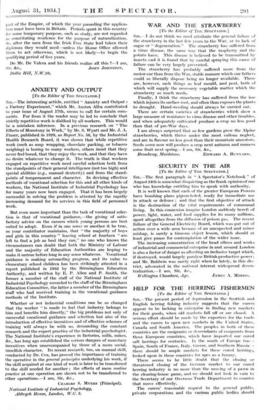ANXIETY AND OUTPUT
[To the Editor of THE SPECTATOR.] Sia,—The interesting article, entitled " Anxiety and Output : a Factory Experiment," which Mr. Austen Albu contributed to your issue of August 17th, seems to call for certain com- ments. For from it the reader may be led to conclude that strictly repetitive work is disliked by all workers. This would be a mistaken inference. In a previous research on " The Effects of Monotony in Work," by Mr. S. Wyatt and Mr. J. A. Fraser, published in 1929, as Report No. 56, by the Industrial Health Research Board, it was shown that while repetitive work (such as soap wrapping, chocolate packing, or tobacco weighing) is boring to many workers, others insist that they never feel bored, that they enjoy the work, and that they have no desire whatever to change it. The truth is that workers engaged on repetitive work need careful selection both from the standpoints of their general intelligence (not too high) and special abilities (e.g., manual dexterity) and from the stand- points of temperament and character. In devising effective methods of vocational selection for this and all other kinds of workers, the National Institute of Industrial Psychology has for many years now been engaged. That it has been largely successful in solving the problem is attested by the rapidly increasing demand for its services in this field of personnel work.
But even more important than the task of vocational selec- tion is that of vocational guidance,—the giving of satis- factory advice on the careers which young persons are best suited to adopt. Even if in one sense or another it be true, as your contributor maintains, that " the majority of boys and girls in this country " leaving school at fourteen " are left to find a job as best they can," no one who knows the circumstances can doubt that both the Ministry of Labour and the majority of Education Authorities are hoping to make it untrue before long in any sense whatever. Vocational guidance is making astounding progress, and its value to elementary school children has been strikingly attested in a report published in 1932 by the Birmingham Education Authority, and written by E. P. Allen and P. Smith, the former a member of the staff of the National Institute of Industrial Psychology seconded to the staff of the Birmingham Education Committee, the latter a member of the Birmingham staff who had received training in the vocational guidance methods of the Institute.
Whether or not industrial conditions can be so changed that the worker is made to feel that industry belongs to him and benefits him directly," the big problems not only of successful vocational guidance and selection but also of the introduction of effective incentives and of effective schemes of training will always be with us, demanding the constant research and the expert practice of the industrial psychologist. The National Institute's experience in factories, mills, mines, dre., has long ago established the serious dangers of monetary incentives when unaccompanied by those of a more social, unselfish character. Its recent research, too, on manual skill, conducted by Dr. Cox, has proved the importance of training the operative in the general principles underlying his work, if the skill acquired at one kind of work is later to be transferred to the skill needed for another ; the effects of mere routine practice at one operation are shown not to be transferred to other operations.—I am, Sir, &c., CHARMS S. MYERS (Principal).
National Institute of Industrial Psychology, Aldwyeh House, London, W.C. 2.






































 Previous page
Previous page